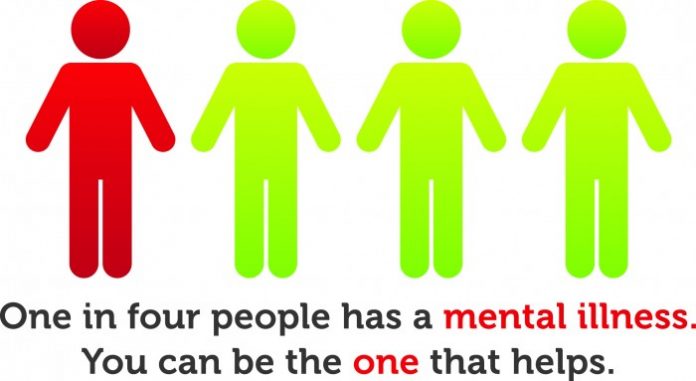Imagine losing interest in your favorite activities. Imagine becoming hostile and aggressive over mild accidents. Imagine having delusions so strong you can not separate them from reality. Imagine how hard it would be to constantly feel these polarizing emotions and then be isolated from your “friends” for something you have no control over. This ridicule is the harsh reality mentally ill people endure on a daily basis. These disorders, even though overall mental health has improved, still exist as a prominent issue.
Mental health does not simply mean freedom from mental illness; mental health gives us the energy to share in relationships and do the things that we love. Despite popular notions, mental and physical health are tightly interconnected. Without a sound mental health, the strength to go out and be proactive does not exist. When mental health becomes unbalanced, confusion and frustration follow, only furthered by being ostracized from the rest of society.
I know firsthand the difficult consequences this isolation can have on a person. I’ve been diagnosed with major depression. My major depression focused on complete apathy, the complete lack of interest or effort in life itself. In addition to feeling nothing but pain, major attacks that restricted my ability to function as a human being occurred frequently. From what I had heard, therapy seemed to be something for only seriously insane people, and simply mentioning you had a therapist sent shocked gasps throughout the room. I already felt like my depression was a problem, and going to therapy for me was like admitting something actually was wrong with me. So I hid these feelings, from my family and friends, for over four years. Depression at its core is one of the most humiliating diseases, making even the simplest things a laborious task. My grades plummeted, I stopped eating, and felt generally pathetic all the time. It took me hitting rock bottom to finally ask for help, and admitting it to my parents was probably the scariest experience of my life. However, when I actually attended weekly therapy, I was stunned. My therapist understood exactly what I was going through, and she helped give me the tools I needed to get my life in check. I raised my grades up to twenty points in each class and got my life back together all within the span of a year. Without therapy, I probably wouldn’t be here today. What surprised me was that without this preconceived notion about therapy, I would have recovered a lot sooner.
My experiences with mental illness are not a particularly special one- millions of people suffer similar circumstances and are suppressed to silence by cultural stigma. Significant attempts throughout the last decade have been made to try to improve life for the mentally ill. Psychologists are constantly creating studies and programs to promote awareness and education; however, none of these programs made any impact whatsoever. In a survey consisting of mentally ill people of all ages, half admitted that significant prejudice against them would occur if they sought treatment, creating lifelong trauma. The social exclusion of their family and friends pushed them to hiding these disorders in favor of a significantly more difficult life. Various other social science studies confirm this sobering trend, a negative stigma towards therapy or medication apparent across all levels of society. Even worse is that despite improvements in mental health literacy, no discernible decrease over a ten year span was measured in social ostracizing of those suffering from these illnesses.
Since the dawn of modern medicine, several new medications have been developed to treat mental illnesses, ranging from behavioral disorders such as ADHD, mood disorders like depression and bipolar disorder, and psychiatric disorders such as schizophrenia. These pharmaceuticals act largely as a positive, helping ease the debilitating symptoms of these disorders. Sadly, these advances in medication have partially contributed to this social exclusion. This isn’t to say that these drugs cannot be in some cases essential, as with extreme depression and psychiatric disorders medication is necessary to stabilize the person. In these circumstances, dialogue during therapy must wait for treatment to stabilize the persons. However, many intentionally avoid face-to-face therapy, seeking instead anti-depressants or other drugs to “cure” them. Why talk about my feelings to some stranger when I can take a pill and feel better? This mentality can quite possibly lead to only a partial improvement, eliminating the symptoms but not the cause. Various unresolved traumas and turmoils requiring the trained tactfulness of a mental health expert cannot be substituted by a medicine targeting a broad range of patients. If allowed to continue untreated, these issues could last for decades as the patient floats from medication to medication.
Even when mental illness is rarely brought up, the media depicts it in a harsh light. In a 2011 study of American newspaper accounts, forty six percent of stories about mental illness mentioned or alluded to violence. Positive coverage of these disorders falls short simply because recovery of mental illness lacks the sensationalism necessary to be broadcasted on mainstream news sources. Mr. Marr wisely compared mental illness to a physical ailment such as cancer. When people are diagnosed with cancer, families and friends flock together to offer support both emotionally and physically through home cooked meals. Mental illness, however, is “met with fear and an automatic stigma” from its portrayal in modern society. This association of mental illness with violence and crime cements fallacies that these people are a danger to themselves and others.
The burning question you might be asking yourself is, “What can we do?” With a system proven by statistics to be largely ineffective and a society where mental illness is perceived as weakness or something to be scared of, the odds of change appear particularly bleak. But, with the help of all of us who have sound mental health, a better world can be imagined for those still suffering from mental illness.
We collectively need to stop treating mental illness as something to be afraid of. These patients are more afraid of their own disorder than we will ever be. The best thing we can possibly do is to provide support and a safety net for those who need our help most. Dr. A.K. Power wrote that the primary task we are charged with is “providing assurance that they will have the care they need.” It is our responsibility as the physically and mentally sound to be Men for Others and take the first steps towards progress.
Programs reaching out as supportive allies to those suffering from mental illness have already been developed. Several high schools in Ontario have been exposed to the You’re Not Alone campaign, which seeks to provide assistance to those suffering from these illnesses. Sheila Neuburger, Vice President of Clinical Services at Ontario Shores, stated the goal of the program is that “if you are hurting, you reach out for help without fear of being judged.” This program confronts Ontario’s huge teen depression problem; suicide is the leading cause of death next to car accidents, and more than three million teens have been diagnosed with mental illness. This sobering statistic extends beyond Canada to the entire world. One in every five teenagers are diagnosed with depression. That means hundreds of students in our Jesuit community could be suffering at this moment without our knowledge. Instead of uncomfortable questions like, “What’s wrong? You look really sad,” try giving silent support through something like a joke. The best way that you can help fight mental illness is to provide support and make sure people always know they are not alone.
We can also change our attitudes towards therapy and medication. Oftentimes, medication and face-to-face therapy are seen as entirely separate categories. However, a combination of both methods proves highly beneficial to mental health. As Mr. McDaniel, junior counselor with a master’s in family therapy, said “pharmaceuticals can help mitigate day-to-day symptoms while therapy can help aid long term suffering.” Medication can be used to help stabilize symptoms in order for therapy sessions to be easier and less difficult for patients. Regardless of the treatment type, we should be proud that courageous steps were taken towards recovery. Knowing how difficult it can be to admit to yourself and others that a problem exists, this fantastic news should be met with gratitude rather than shock. Instead of making people uncomfortable when they seek help, try congratulating them for moving towards recovery.
According to the National Institute of Mental Health, disorder rates are alarmingly high. Half of the population is likely to develop lifelong mental illnesses, and a quarter of adults also suffer from these diseases. However, we have an opportunity to make a change for the better. Just as medicine to help combat mental illness continues to become widely available, so can our social reaction towards these disease evolve. The irony of telling someone who’s mentally unwell, “It’s all in your head,” is that these preconceived notions of themselves are just that, all in their heads. I urge all of us to break the standard of exclusion and isolation, to reach out to those who need our help most, and to help make the world a happier place for everyone.
Sources:
Pescosolido, B. A. (2013). The public stigma of mental illness: What do we think; what do we know; what can we prove? Journal of Health and Social Behavior, 54(1), 1-21. Retrieved from http://search.proquest.com/docview/1465415619?accountid=36295
Power, A. K. (2010). Transforming the nation’s health: Next steps in mental health promotion. American Journal of Public Health, 100(12), 2343-6. Retrieved from http://search.proquest.com/docview/804374993?accountid=36295
Mental health; ontario shores unveils mental health education and awareness program. (2011). Education Business Weekly, , 138. Retrieved from http://search.proquest.com/docview/900500768?accountid=36295
NIMH, (2012, January 1). What is prevalence? Retrieved from http://www.nimh.nih.gov/health/statistics/prevalence/index.shtml






